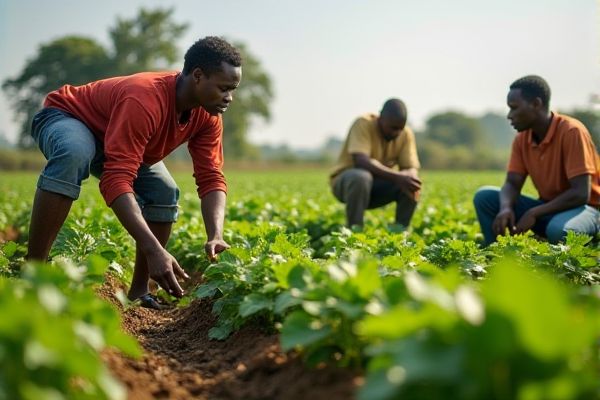
Zambia's agricultural sector offers various job opportunities within non-governmental organizations (NGOs) focused on sustainable development and food security. Positions are available in areas such as project management, agronomy, and community development, where professionals can contribute to enhancing agricultural practices and improving livelihoods. Many NGOs seek individuals with expertise in sustainable farming methods, food systems, and economic empowerment initiatives. Networking and engaging with local NGOs can provide valuable insights into available roles and ongoing projects that align with your skills and interests.
Job Description
NGO agriculture jobs in Zambia often involve working with local communities to improve farming practices and food security. Positions may include roles such as project coordinators, field officers, and agricultural advisors, all focused on sustainable agriculture and rural development. Responsibilities typically encompass implementing training programs, conducting research on crop yields, and promoting sustainable practices that benefit both farmers and the environment. These jobs are crucial for enhancing agricultural productivity and addressing food scarcity challenges in Zambia, making a significant impact on the livelihoods of many.
Requirement
NGOs in Zambia often seek individuals for agricultural positions that have a strong background in sustainable farming practices, crop management, or agricultural education. Experience with community engagement and the ability to work in diverse rural settings are highly valued. Qualifications may include a degree in agriculture or related fields, along with practical skills in project management and monitoring. A passion for improving food security and supporting local farmers can significantly enhance your candidacy for these roles.
Salary and Perks Expected
In Zambia, NGO agriculture jobs often offer salaries ranging from $500 to $1,200 per month, depending on the role and experience level. Benefits may include health insurance, travel allowances, and opportunities for professional development through workshops and training sessions. Many positions also emphasize the impact of sustainable farming practices and food security, aligning with the broader goals of improving community livelihoods. Pursuing a career in this sector not only provides financial rewards but also contributes to vital socioeconomic advancements in the region.
Similar Job Names
- Agricultural Program Manager
- Community Development Officer
- Agronomist
- Livelihoods Coordinator
- Food Security Specialist
- Agricultural Extension Worker
- Monitoring and Evaluation Officer
- Project Officer
- Research Scientist
- Rural Development Specialist
- Training Coordinator
- Advocacy Officer
- Crop Production Specialist
- Water and Sanitation Officer
- Policy Analyst
- Sustainable Agriculture Consultant
- Climate Change Adaptation Specialist
- Gender and Agriculture Advisor
- Grant Writer
- Field Coordinator
Job Expectation Concept
Zambia's NGO agriculture jobs often focus on sustainable farming practices, community development, and capacity building among local farmers. These positions typically involve implementing agricultural programs that enhance food security and promote sustainable resource management. You may engage with various stakeholders, including farmers, government bodies, and other NGOs, to design and execute effective agricultural initiatives. Continuous training and support play a critical role in helping communities adapt to changing agricultural challenges and improve their livelihoods.
Career Advantage and Weakness
NGO agriculture jobs in Zambia offer the advantage of contributing to sustainable development while supporting local communities. These positions often provide access to training and resources that enhance skill sets, thereby improving your employability in the agricultural sector. However, a common weakness is the tendency for job security to be less stable due to fluctuating funding sources and project timelines. This instability can make long-term career planning challenging for individuals pursuing a career in this field.
Important Thing Must Know
Zambia's NGO agriculture sector offers diverse job opportunities aimed at improving food security and promoting sustainable farming practices. These positions often focus on community engagement, capacity building, and training local farmers in innovative agricultural techniques. Roles may include project management, research, and fieldwork, allowing for direct involvement with local communities. A strong understanding of Zambian agricultural policies and local crop production is essential for success in these roles. Building connections with local stakeholders can enhance your impact and contribute to the overall development of the agriculture sector in Zambia.
Alternative Career Options
In Zambia, the agricultural sector presents various alternative career options beyond traditional NGO roles. Opportunities exist in agribusiness, where you can engage in supply chain management, marketing, or product development for local farmers. Environmental consultancy is another option, allowing for work in sustainable farming practices and land conservation efforts. Community-based projects that focus on training and education can empower local farmers while fostering skills development and entrepreneurship.
Companies List
- Ripple Effect
- World Wildlife Fund (WWF)
- International Development Enterprises (IDE) Zambia
- Concern Worldwide
- Oxfam Zambia
- Food and Agriculture Organization (FAO)
- ActionAid Zambia
- Zambian National Farmers Union (ZNFU)
- Heifer International Zambia
- Mercy Corps Zambia
List of Ideal City
Zambia offers various cities that are ideal for NGO agriculture jobs, including Lusaka, the capital, which provides numerous opportunities and resources for agricultural development. Ndola, known for its rich farming landscapes, also hosts several NGOs focused on sustainable agriculture and community support. Livingstone, famous for its tourism, offers agricultural programs that enhance local food production while embracing eco-friendly practices. Kabwe, with its fertile land and strong community ties, presents excellent options for you to engage in agricultural initiatives that drive social change.
 zambia-jobs.com
zambia-jobs.com